News
News
.JPG) However, Gongorjav found art, not in the new life sprouting on the forest floor, but in the fallen and decaying trees that had left their final marks on the world. In his desire to share these with the world, he presents his gallery "The Song of Fallen Birches", qualified by the subtitle, (The Birches Are Painting). At the dusk of his 83rd year of age, the chemist, geologist, journalist, anthropologist, naturist, professor, and Mongolian Distinguished Worker Gongorjav Gombojav presents his gallery "The Song of Fallen Birches" at the Mongolian National Museum under the "Suvdan Sondor" program. This marks our Academy's last arts and culture program for 2018.
However, Gongorjav found art, not in the new life sprouting on the forest floor, but in the fallen and decaying trees that had left their final marks on the world. In his desire to share these with the world, he presents his gallery "The Song of Fallen Birches", qualified by the subtitle, (The Birches Are Painting). At the dusk of his 83rd year of age, the chemist, geologist, journalist, anthropologist, naturist, professor, and Mongolian Distinguished Worker Gongorjav Gombojav presents his gallery "The Song of Fallen Birches" at the Mongolian National Museum under the "Suvdan Sondor" program. This marks our Academy's last arts and culture program for 2018.
.JPG)
"The Song of Fallen Birches" exhibition
News
An article on THE TIMES LITERARY SUPPLEMENT
Literary Mongolia: Word on the steppe
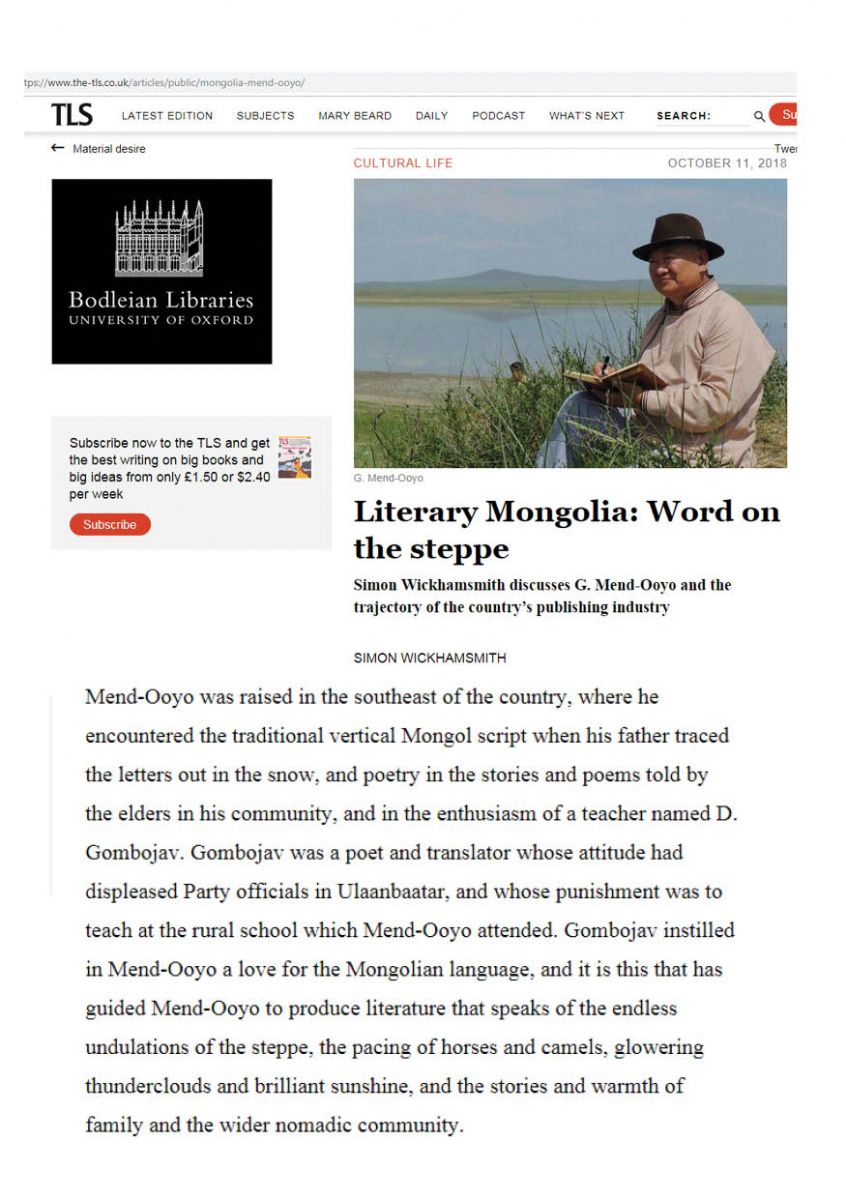 I talked with my friend G. Mend-Ooyo, whose work I have often translated, and who is one of Mongolia’s leading writers and cultural critics, about the use of censorship when he was starting out as a poet. He described to me how Glavlit processed his first book, Birds of Thought, before its publication in 1980. Mend-Ooyo initially submitted his poems to the Writers’ Union’s head of poetry, who at that time happened to be his mentor, B.Yavuuhulan. Yavuuhulan approved the manuscript, but said that Mend-Ooyo should include something about Lenin or the Soviet Union, a nod to the “friendship” that existed between the two countries and their increasingly old and stubborn leadership. The manuscript, duly augmented by “In the Lenin Museum”, was then sent to the head of the Writers’ Union, and after some weeks it was approved and sent to the censorship bureau. Only after each poem had been read, and each page stamped as ideologically acceptable (literally each page: if a censor missed a page, or made any kind of error, they would probably lose what was a powerful and influential position), did the manuscript go forward to publication. So slowly did the wheels grind that Birds of Thought took three years from initial submission to publication. Glavlit, as part of the Party machinery, kept detailed files on the literary and political activity of all those whose manuscripts were submitted, but when I asked Mend-Ooyo whether he had seen his Glavlit file (in the hope that I, too, could take a look), he said that all the files had been destroyed by fire during the rioting that followed the national elections of July 2008.
I talked with my friend G. Mend-Ooyo, whose work I have often translated, and who is one of Mongolia’s leading writers and cultural critics, about the use of censorship when he was starting out as a poet. He described to me how Glavlit processed his first book, Birds of Thought, before its publication in 1980. Mend-Ooyo initially submitted his poems to the Writers’ Union’s head of poetry, who at that time happened to be his mentor, B.Yavuuhulan. Yavuuhulan approved the manuscript, but said that Mend-Ooyo should include something about Lenin or the Soviet Union, a nod to the “friendship” that existed between the two countries and their increasingly old and stubborn leadership. The manuscript, duly augmented by “In the Lenin Museum”, was then sent to the head of the Writers’ Union, and after some weeks it was approved and sent to the censorship bureau. Only after each poem had been read, and each page stamped as ideologically acceptable (literally each page: if a censor missed a page, or made any kind of error, they would probably lose what was a powerful and influential position), did the manuscript go forward to publication. So slowly did the wheels grind that Birds of Thought took three years from initial submission to publication. Glavlit, as part of the Party machinery, kept detailed files on the literary and political activity of all those whose manuscripts were submitted, but when I asked Mend-Ooyo whether he had seen his Glavlit file (in the hope that I, too, could take a look), he said that all the files had been destroyed by fire during the rioting that followed the national elections of July 2008.
https://www.the-tls.co.uk/articles/public/mongolia-mend-ooyo/
 I talked with my friend G. Mend-Ooyo, whose work I have often translated, and who is one of Mongolia’s leading writers and cultural critics, about the use of censorship when he was starting out as a poet. He described to me how Glavlit processed his first book, Birds of Thought, before its publication in 1980. Mend-Ooyo initially submitted his poems to the Writers’ Union’s head of poetry, who at that time happened to be his mentor, B.Yavuuhulan. Yavuuhulan approved the manuscript, but said that Mend-Ooyo should include something about Lenin or the Soviet Union, a nod to the “friendship” that existed between the two countries and their increasingly old and stubborn leadership. The manuscript, duly augmented by “In the Lenin Museum”, was then sent to the head of the Writers’ Union, and after some weeks it was approved and sent to the censorship bureau. Only after each poem had been read, and each page stamped as ideologically acceptable (literally each page: if a censor missed a page, or made any kind of error, they would probably lose what was a powerful and influential position), did the manuscript go forward to publication. So slowly did the wheels grind that Birds of Thought took three years from initial submission to publication. Glavlit, as part of the Party machinery, kept detailed files on the literary and political activity of all those whose manuscripts were submitted, but when I asked Mend-Ooyo whether he had seen his Glavlit file (in the hope that I, too, could take a look), he said that all the files had been destroyed by fire during the rioting that followed the national elections of July 2008.
I talked with my friend G. Mend-Ooyo, whose work I have often translated, and who is one of Mongolia’s leading writers and cultural critics, about the use of censorship when he was starting out as a poet. He described to me how Glavlit processed his first book, Birds of Thought, before its publication in 1980. Mend-Ooyo initially submitted his poems to the Writers’ Union’s head of poetry, who at that time happened to be his mentor, B.Yavuuhulan. Yavuuhulan approved the manuscript, but said that Mend-Ooyo should include something about Lenin or the Soviet Union, a nod to the “friendship” that existed between the two countries and their increasingly old and stubborn leadership. The manuscript, duly augmented by “In the Lenin Museum”, was then sent to the head of the Writers’ Union, and after some weeks it was approved and sent to the censorship bureau. Only after each poem had been read, and each page stamped as ideologically acceptable (literally each page: if a censor missed a page, or made any kind of error, they would probably lose what was a powerful and influential position), did the manuscript go forward to publication. So slowly did the wheels grind that Birds of Thought took three years from initial submission to publication. Glavlit, as part of the Party machinery, kept detailed files on the literary and political activity of all those whose manuscripts were submitted, but when I asked Mend-Ooyo whether he had seen his Glavlit file (in the hope that I, too, could take a look), he said that all the files had been destroyed by fire during the rioting that followed the national elections of July 2008. https://www.the-tls.co.uk/articles/public/mongolia-mend-ooyo/
News
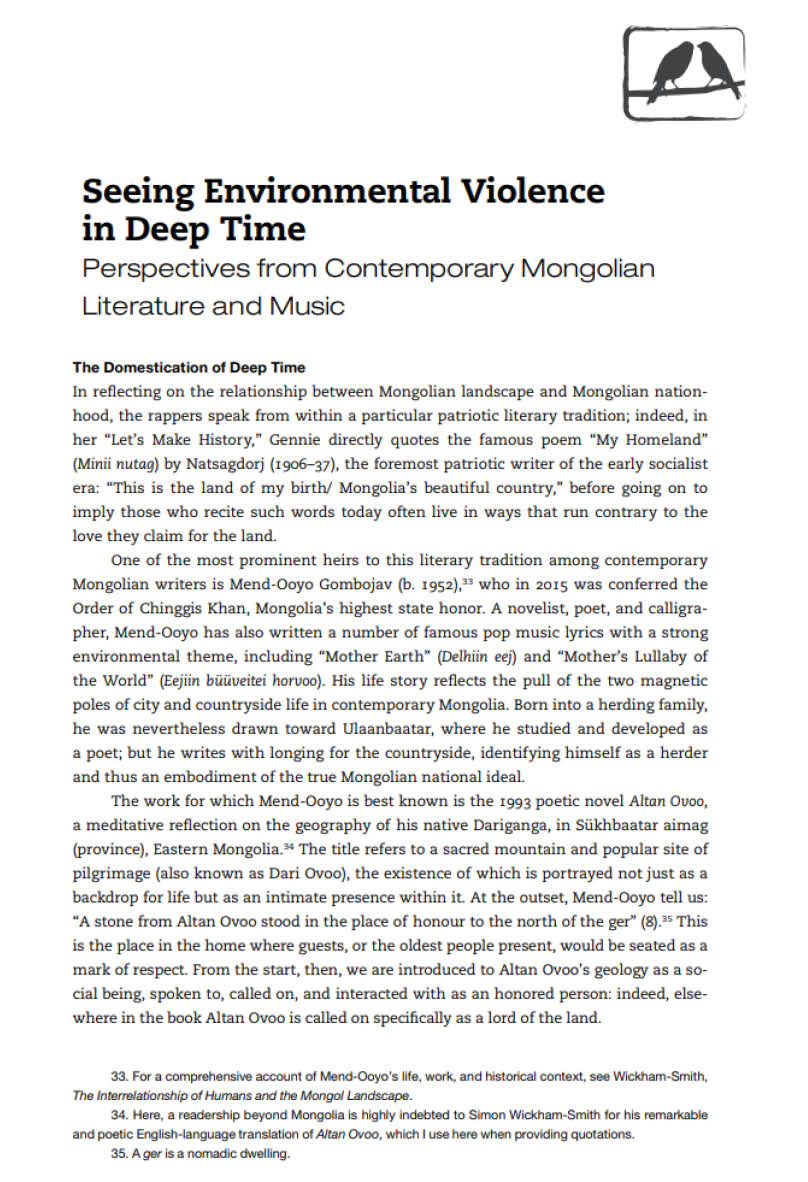 A research paper featuring Mend-Ooyo’s works has appeared in Environmental Humanities (2018) 10 (1) page 257-272, published by Duke University Press. In the latter half of his paper titled Environmental Violence in Deep Time: Perspectives from Contemporary Mongolian Literature and Music, Dr. Richard Irvine writes about the literary work of G. Mend-Ooyo, and uses it to draw attention to Mongolians' changing relationship with the environment created by the massive shifts in environment modernization has created.
A research paper featuring Mend-Ooyo’s works has appeared in Environmental Humanities (2018) 10 (1) page 257-272, published by Duke University Press. In the latter half of his paper titled Environmental Violence in Deep Time: Perspectives from Contemporary Mongolian Literature and Music, Dr. Richard Irvine writes about the literary work of G. Mend-Ooyo, and uses it to draw attention to Mongolians' changing relationship with the environment created by the massive shifts in environment modernization has created.
The paper for free on the Duke University Press website, cited below.
Irvine, Richard D. G. “Seeing Environmental Violence in Deep Time.” Environmental Humanities, vol. 10, no. 1, May 2018, pp. 257–72. Crossref, doi:10.1215/22011919-4385562,https://read.dukeupress.edu/environmental-humanities/article/10/1/257/134698/Seeing-Environmental-Violence-in-Deep.
A Research Paper Featuring Mend-Ooyo’s Works Published in Environmental Humanities
 A research paper featuring Mend-Ooyo’s works has appeared in Environmental Humanities (2018) 10 (1) page 257-272, published by Duke University Press. In the latter half of his paper titled Environmental Violence in Deep Time: Perspectives from Contemporary Mongolian Literature and Music, Dr. Richard Irvine writes about the literary work of G. Mend-Ooyo, and uses it to draw attention to Mongolians' changing relationship with the environment created by the massive shifts in environment modernization has created.
A research paper featuring Mend-Ooyo’s works has appeared in Environmental Humanities (2018) 10 (1) page 257-272, published by Duke University Press. In the latter half of his paper titled Environmental Violence in Deep Time: Perspectives from Contemporary Mongolian Literature and Music, Dr. Richard Irvine writes about the literary work of G. Mend-Ooyo, and uses it to draw attention to Mongolians' changing relationship with the environment created by the massive shifts in environment modernization has created.The paper for free on the Duke University Press website, cited below.
Irvine, Richard D. G. “Seeing Environmental Violence in Deep Time.” Environmental Humanities, vol. 10, no. 1, May 2018, pp. 257–72. Crossref, doi:10.1215/22011919-4385562,https://read.dukeupress.edu/environmental-humanities/article/10/1/257/134698/Seeing-Environmental-Violence-in-Deep.
News
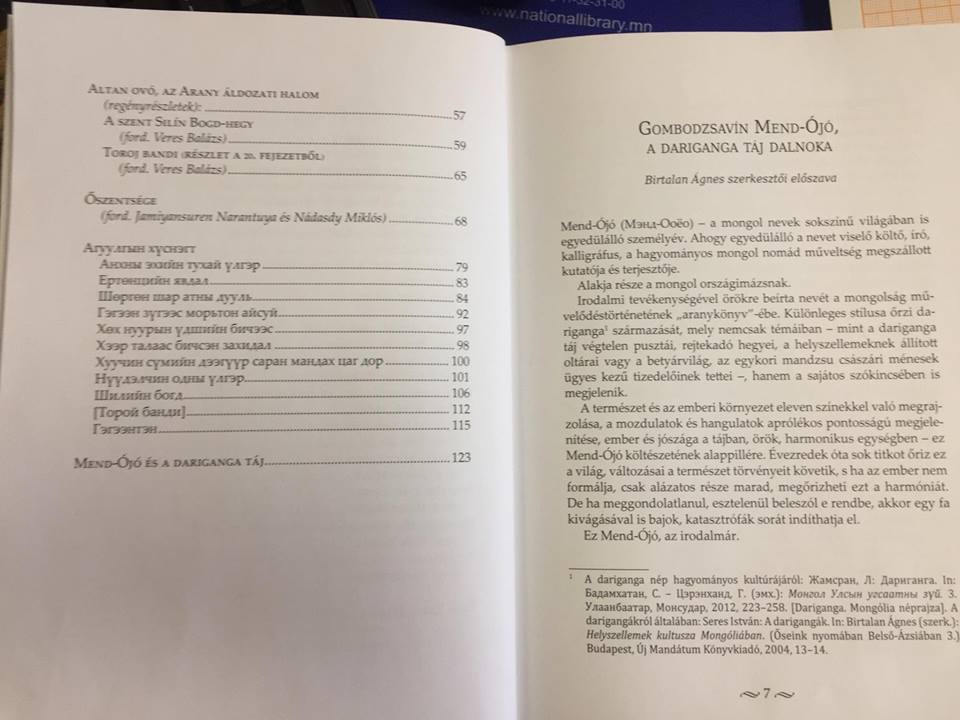
After years of close and careful deliberation experimenting with a new method of translation, a hungarian team has published a book. The new book, Mongol Betyardal (The Song of Good Mongolian Men) features translations of one chapter each of “The Holy One” and “Shiliin Bogd” novels, as well as several poems including “The Way of the World”, “Quickwit Camel”, and “Letters from the Steppe”. Professor Birtalan Ágnes herself presented the book to Mend-Ooyo.
The book was started as the 2015 summer project of the PUBLIC SCHOOL program incepted by the Lezsák Sándor, a Hungarian poet, teacher and politician and was managing Speaker of the National Assembly of Hungary since Speaker, The final publication was released under the KAIROSZ publishing company.
A New Book Published in Hungary

After years of close and careful deliberation experimenting with a new method of translation, a hungarian team has published a book. The new book, Mongol Betyardal (The Song of Good Mongolian Men) features translations of one chapter each of “The Holy One” and “Shiliin Bogd” novels, as well as several poems including “The Way of the World”, “Quickwit Camel”, and “Letters from the Steppe”. Professor Birtalan Ágnes herself presented the book to Mend-Ooyo.
The book was started as the 2015 summer project of the PUBLIC SCHOOL program incepted by the Lezsák Sándor, a Hungarian poet, teacher and politician and was managing Speaker of the National Assembly of Hungary since Speaker, The final publication was released under the KAIROSZ publishing company.
News
A NEW BOOK PUBLISHED IN HUNGARY
After years of close and careful deliberation, the translation team has published a book, showcasing the success of their experiment. The new book,Mongol Betyardal (The Song of Good Mongolian Men) features translations of one chapter each of “The Holy One” and “Shiliin Bogd” novels, as well as several poems including “The Way of the World”, “Quickwit Camel”, and “Letters from the Steppe”. Professor Birtalan Ágnes herself presented the book to Mend-Ooyo.
The book was started as the 2015 summer project of the PUBLIC SCHOOL program incepted by the Lezsák Sándor, a Hungarian poet, teacher and politician and was managing Speaker of the National Assembly of Hungary since Speaker, The final publication was released under the KAIROSZ publishing company.
The book was started as the 2015 summer project of the PUBLIC SCHOOL program incepted by the Lezsák Sándor, a Hungarian poet, teacher and politician and was managing Speaker of the National Assembly of Hungary since Speaker, The final publication was released under the KAIROSZ publishing company.
News
Interview with Robert H. Lieberman
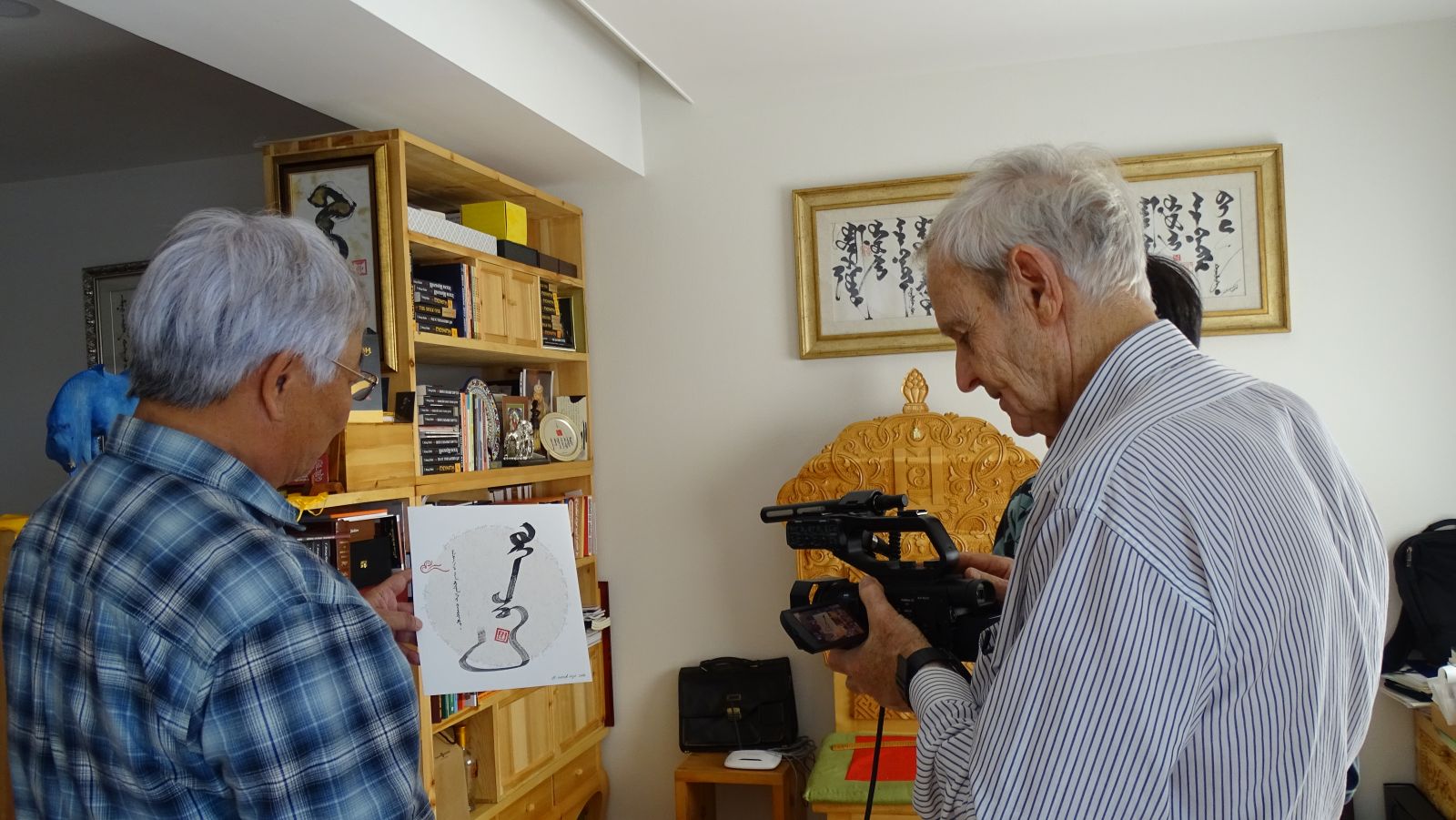 Mr. Robert H. Lieberman from Ithaca Filmworks, arrived at Mend-Ooyo’s studio today and interviewed him about various aspects of his life, including childhood life, horses, Mongolian script, calligraphy, and poetry. Alongside his work as a filmmaker, Mr. Lieberman also teaches physics at Cornell University and has written several novels.
Mr. Robert H. Lieberman from Ithaca Filmworks, arrived at Mend-Ooyo’s studio today and interviewed him about various aspects of his life, including childhood life, horses, Mongolian script, calligraphy, and poetry. Alongside his work as a filmmaker, Mr. Lieberman also teaches physics at Cornell University and has written several novels.
News
Met with President of Mongolia at the Bookfair
On the second day of the Spring Bookfair - 2018, Mend-Ooyo was visited in his booth by the President of Mongolia. This marks the first meeting with the newly inaugurated president, who specifically seeked to meet Mend-Ooyo and get some of his signed books.
News
Lecture for the Officers of Mongol Bank.
On the 8th of June, Mend-Ooyo was invited to give a lecture to the officers of Mongol Bank. The bank holds in its possession precious artifacts of Mongolian heritage and culture. As part of his lecture, he talked about the story of how they built the complex of the Migjed Janraiseg under hard economic conditions, and how we must always keep in the forefront of our minds the value of our cultural heritage.
News
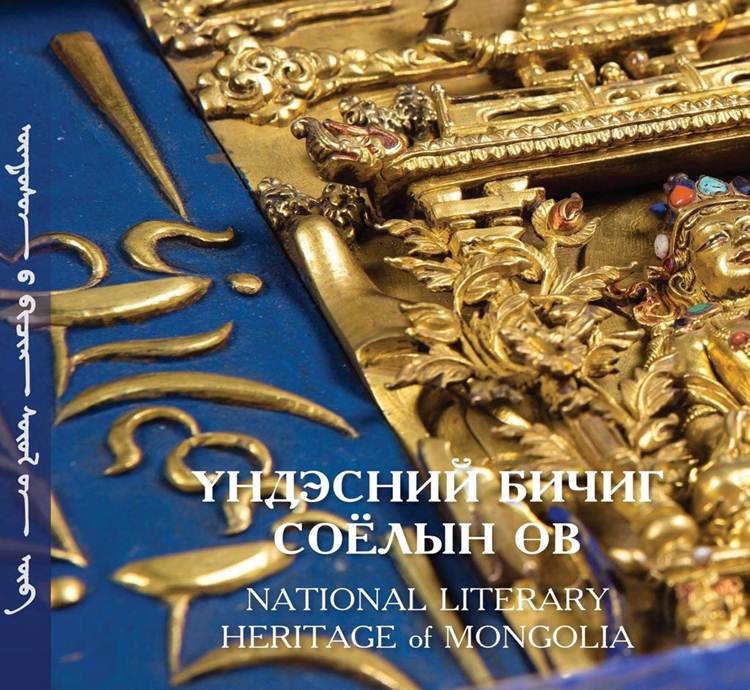 Mend-Ooyo is one of the founders and board members of the Arts Council of Mongolia. He was invited to write a foreword to the book, National Literary Heritage of Mongolia, which catalogues the valuable literary heritage contained in the National Library of Mongolia.
Mend-Ooyo is one of the founders and board members of the Arts Council of Mongolia. He was invited to write a foreword to the book, National Literary Heritage of Mongolia, which catalogues the valuable literary heritage contained in the National Library of Mongolia.
Wrote a Foreword to the Book National Literary Heritage of Mongolia
 Mend-Ooyo is one of the founders and board members of the Arts Council of Mongolia. He was invited to write a foreword to the book, National Literary Heritage of Mongolia, which catalogues the valuable literary heritage contained in the National Library of Mongolia.
Mend-Ooyo is one of the founders and board members of the Arts Council of Mongolia. He was invited to write a foreword to the book, National Literary Heritage of Mongolia, which catalogues the valuable literary heritage contained in the National Library of Mongolia. News

